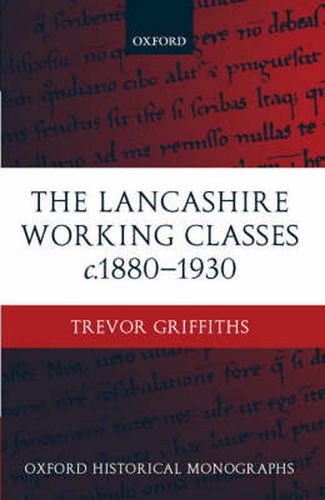Readings Newsletter
Become a Readings Member to make your shopping experience even easier.
Sign in or sign up for free!
You’re not far away from qualifying for FREE standard shipping within Australia
You’ve qualified for FREE standard shipping within Australia
The cart is loading…






This book examines the experiences and values which shaped working-class life in Britain in the half-century from 1880. It takes as its focus a region, Lancashire, which was central to the social and political changes of the period. The discussion centres on two towns, Bolton and Wigan, which, while they were geographically close, differed significantly in their industrial fortunes and their electoral development. The formation of class identity is traced through developments in the world of work, from the impact of technological and managerial innovations to the elaboration of collective-bargaining procedures. Beyond work, particular attention is paid to the dynamics of neighbourhood and family life, the latter emerging as an important source of continuity in working-class life. The broader impact of such influences are traced through a close examination of the electoral politics of the period. Dr Griffiths’ conclusions fundamentally challenge the notion that the fifty years around the turn of the century witnessed the emergence of a working class more culturally and politically united than at any other time, either before or since. Rather, an alternative narrative of class development is offered, in which broad continuities in working-class life, in particular the survival of religious, ethnic, and occupational points of division, are emphasised. Despite the presence of strong and stable labour institutions, from trade unions to Co-operative and Friendly Societies, the picture emerges of a working class more individualist than collectivist in outlook, more flexible in response to economic change, and less constrained by the broader solidarities of work and neighbourhood than has previously been supposed.
$9.00 standard shipping within Australia
FREE standard shipping within Australia for orders over $100.00
Express & International shipping calculated at checkout
This book examines the experiences and values which shaped working-class life in Britain in the half-century from 1880. It takes as its focus a region, Lancashire, which was central to the social and political changes of the period. The discussion centres on two towns, Bolton and Wigan, which, while they were geographically close, differed significantly in their industrial fortunes and their electoral development. The formation of class identity is traced through developments in the world of work, from the impact of technological and managerial innovations to the elaboration of collective-bargaining procedures. Beyond work, particular attention is paid to the dynamics of neighbourhood and family life, the latter emerging as an important source of continuity in working-class life. The broader impact of such influences are traced through a close examination of the electoral politics of the period. Dr Griffiths’ conclusions fundamentally challenge the notion that the fifty years around the turn of the century witnessed the emergence of a working class more culturally and politically united than at any other time, either before or since. Rather, an alternative narrative of class development is offered, in which broad continuities in working-class life, in particular the survival of religious, ethnic, and occupational points of division, are emphasised. Despite the presence of strong and stable labour institutions, from trade unions to Co-operative and Friendly Societies, the picture emerges of a working class more individualist than collectivist in outlook, more flexible in response to economic change, and less constrained by the broader solidarities of work and neighbourhood than has previously been supposed.